Top 10 Gadgets & New Technology
Another year has started, and with it, another Consumer Electronics Show (CES) has taken place. This is the biggest and most influential tech event worldwide, held in the first week of every year at the Las Vegas Convention Center in Winchester, Nevada, United States.
During the event, several tech companies from all over the world announce brand-new tech products and experimental concepts, including not only renowned tech brands, but also startup companies, and CES 2025 is no different.
At this year’s CES, we’ve seen a lot of new tech, from everyday gadgets and smart home products to health devices, computing solutions, cutting-edge AI technologies, and much more.
Here are the best products of CES 2025 that have impressed us the most here at GadgetGram.
The Best Gadgets from CES 2025
ASUS Zenbook A14
ASUS has recently unveiled its newest laptop, the ASUS Zenbook A14, which the company proudly labelled as “the lightest Copilot+ PC in the world”. ASUS’ new Zenbook A14 aims to redefine lightweight laptops, while also addressing traditional challenges like durability, performance, cooling, battery life, limited ports, and cost.
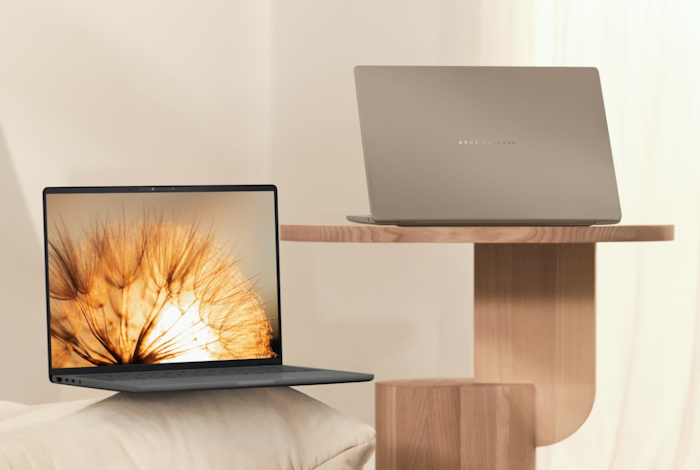
The laptop is incredibly lightweight, weighing between just 2.2 and 2.4 lbs. It also packs a sturdy construction thanks in large part to its chassis, which is built of ASUS’s unique Ceraluminum case material. Its high-tech Ceraluminum finish contributes to the laptop’s durability, offering exceptional scratch, smudge, and wear resistance.
Despite being lightweight, the ASUS Zenbook A14 packs great capabilities designed for daily use. It features a sleek 14-inch OLED screen that boasts a 1920 x 1200 resolution in a 16:10 aspect ratio, cinema-grade 100% DCI-P3 color gamut that delivers ultra-vivid colors, and a 60Hz refresh rate with 0.2 ms response time.
Additionally, the laptop is powered by Snapdragon X Series Processors, making it capable of delivering up to 45W TDP performance along with 45 TOPS of NPU power. It also features a 70Wh battery that offers up to 32 hours battery life, ensuring all-day usage. Plus, it also integrates a decent array of connection ports, including USB-C, USB-A and HDMI.
The ASUS Zenbook A14 is available in two (x2) color options: Zabriskie Beige and Iceland Gray.
Pricing for the Zenbook A14 starts at $1,099.99.
Urtopia Titanium Zero
As far as daily commuting goes, e-bikes have become a very popular means of transportation in today’s modern society, especially in urban areas. Urtopia showcased its newest e-bike, the Urtopia Titanium Zero, which they claim to be the world’s lightest, strongest, and most durable e-bike.
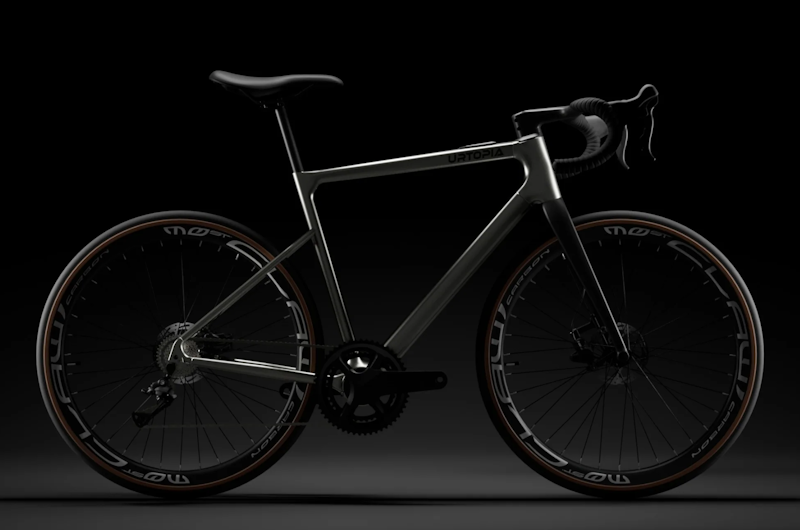
This ultra-lightweight electric bike sports a fully 3D-printed titanium alloy frame, weighs an astonishing 23.8 lbs (10.8kg), and also comes equipped with durable carbon wheels, fork, crankset, and a titanium seatpost.
It also features a SRAM 12-speed gear shift system (electronic shifting compatible), a custom-designed Quark DM1.2 mid-drive motor, the smallest, lightest, and highest torque-density motor of its type that’s currently available.
Its Quark DM1.2 mid-drive motor works in combination with a reducer and a clutch unit, delivering powerful torque up to 65 Nm, while built-in high-precision torque sensors and dynamic magnetic encoders ensure smooth, precise assistance, offering effortless control and a natural ride on any terrain.
The bike’s motor is powered by a 300Wh solid-state battery.
The company hasn’t stated when it’s planning to start manufacturing the Urtopia Titanium Zero, so we’ll have to wait for updates.
WeWalk Smart Cane 2
Nowadays, pretty much every tech product leverages AI, and the WeWalk Smart Cane 2 is no different. This is WeWalk’s 2nd-generation smart white cane, which unlike the original model, now features AI technology.
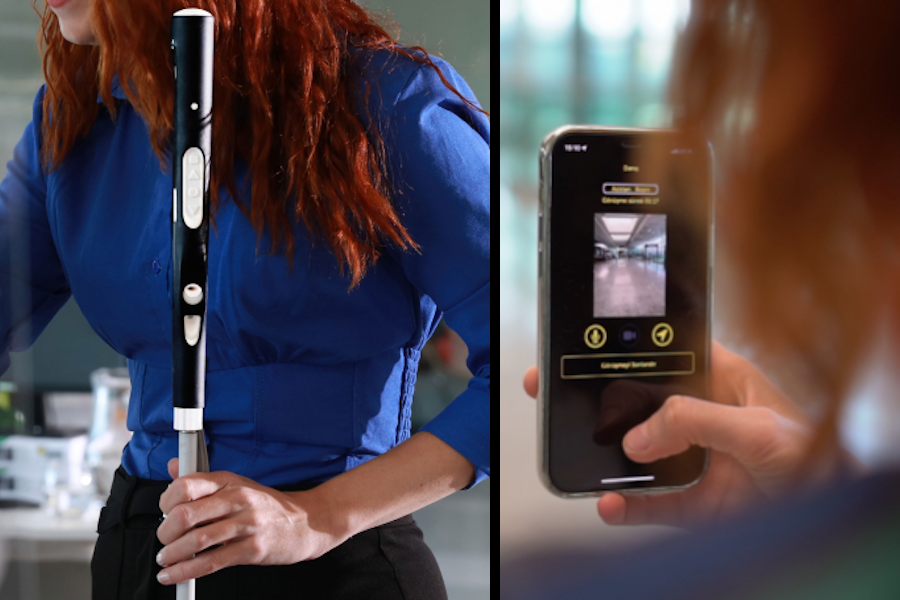
While this smart cane is designed to be the same size and weight as a standard white cane, the WeWalk Smart Cane 2 now brings more advanced motion sensors powered by custom-designed detection technology that provide enhanced obstacle detection, ensuring users stay safe while moving and aware of their surroundings at all times. This innovative feature enables the cane to alert users of nearby obstacles through haptic and audible feedback, all while maintaining the ground-level feedback of a standard white cane.
Additionally, the cane also has a rainwater-resistant construction and even integrates a built-in flashlight to help make the visually impaired more noticeable at night.
More impressively, the WeWalk Smart Cane 2 also features an intelligent voice assistant that’s powered by ChatGPT, which makes it capable of answering any question you might have (such as the menu prices at your local café) through a set of built-in speakers to make traveling simpler and more enjoyable.
Plus, it also offers its users turn-by-turn navigation, along with the ability to help them find public transport options and also explore nearby points of interests, all with just the simple push of a button on its handle, which features a set of tactile buttons arranged in a user-friendly layout that make using the cane’s smart functions easy and comfortable.
Best of all, the WeWalk Smart Cane 2 now works together with WeWalk’s WeASSIST, a visual assistance service that allows for visually impaired people to receive detailed visual assistance from professionally trained agents. Users can connect directly with the company’s agents through the WeWALK App to get live assistance with various tasks such as indoor navigation at airports, or even providing visual descriptions of objects and text.
Pricing for the Smart Cane 2 starts at $850.
Moonbird Moonbuddy
Gadgets made for relaxation are only getting better with technology, and the Moonbuddy definitely simplifies that process for kids. Designed by wellness brand Moonbird, this guided-breathing and -meditation device for children helps reduce stress and anxiety as well as improve sleep.

It consists of a compact, egg-shaped device with a scree-free design that promotes ease of use. It also comes with a removable, cute animal sleeve made of silicone that’s easy to clean, giving the device a toy-like look.
The Moonbuddy’s tummy area is soft and squishy, offering children tactile guidance for calming breathing exercises by expanding and contracting in set rhythms, helping kids to follow along and sync up their own breathing. It features four different breathing modes to help children calm down through controlled breathing, which range from 6 breaths per minute to 10.5 breaths per minute.
The device has a button at its backside for starting its operation, integrates a rechargeable battery for hassle-free use, and stops automatically to help save battery power.
More importantly, unlike the company’s original stress relief device for adults, the Moonbuddy doesn’t connect to a mobile app, making guided breathwork easier and more accessible to children.
The Moonbuddy goes for $89 and comes with one silicone animal sleeve, for which parents and their kids can choose between two different variants: Bibi the bird and Barry the bear.
Roborock Saros Z70
Smart robot vacuums have revolutionized home cleaning with their powerful cleaning performance and intelligent navigation, saving you time and effort in keeping your living space clean. Roborock recently introduced its new robot vacuum at CES 2025, the Roborock Saros Z70.
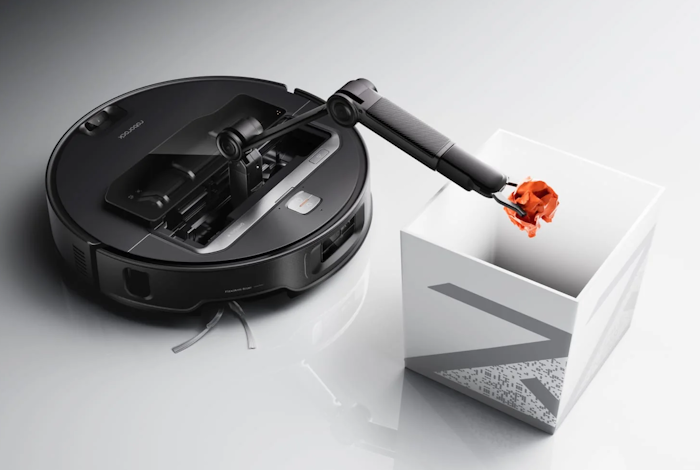
This is the first robot vacuum with a foldable five-axis OmniGrip mechanical arm, which allows it to pick up objects weighing up to 300 grams (0.66 lbs.) and move them out of the way to clean areas or move them to a target location, including objects like cords, shoes, cat toys, or even loose trash.
Functionality of its mechanical arm is disabled by default and can be activated and customized via the Roborock App, through which users can program it to pick up different objects. By using AI technology, the vacuum can automatically recognize 108 pre-programmed objects, but you can also teach it to detect up to 50 additional items (via the app).
This smart robot vacuum also combines a StarSight Autonomous Navigation System 2.0 with dual cameras: one on its mechanical arm to accurately detect and grip objects, and one at the front of its body. It also features an industry-first AdaptiLift Chassis featuring independently adjustable three-wheel control for versatile climbing over carpets, doorsills and rails.
The Saros Z70 has an ultra-slim design and comes equipped with a main brush, side brush, dual mops powered by FlexiArm technology, which makes it capable of expertly sweeping dirt from corners, edges, and under furniture, ensuring complete cleaning coverage while leaving no blind spots behind.
The robot features up to 22,000Pa suction power, an emergency button for pausing it manually, and a child lock.
Lastly, it also comes with a multifunctional station that provides 10-in-1 hands-free maintenance for the robot vacuum, featuring auto dust emptying, auto mop removal, self-cleaning and mop washing with hot water at 80ºC, warm air drying at 55ºC, warm water tank refilling, auto detergent dispenser, 2.5 hours fast charging, and more.
The Saros Z70 is expected to launch in May or June of 2025. While Roborock hasn’t announced an official price for it, it’s estimated that the Saros Z70 will go for approximately $2,000.
Technics EAH-AZ100 True Wireless Earbuds
For music lovers looking for earbuds that can deliver the best possible sound quality, Technics’s new flagship EAH-AZ100 true wireless earbuds are an outstanding choice, equaling high-end options from bigger brands like Sony, Bose, and Sennheiser.
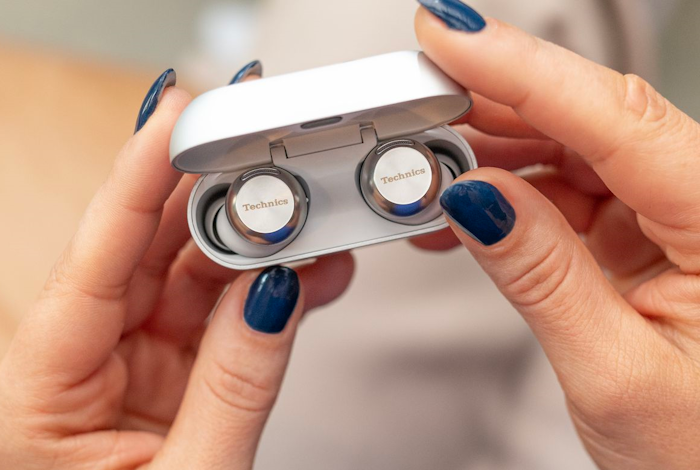
Upgraded from Technics’s previous earbuds model (the AZ80), the Technics EAH-AZ100 earbuds are powered by new magnetic fluid drivers that boost audio quality, producing incredibly clear and detailed sound with even better bass, something that both casual music lovers and true audiophiles will surely appreciate.
They also feature a ANC, a Conversation Mode that activates with one touch to pause sound and turn transparency on, and also support spatial Dolby Atmos audio and LDAC high-res wireless audio.
The company made the EAH-AZ100 smaller and lighter than their predecessor model, and also re-designed the earbuds’ shape to promote extra comfort and help users achieve a more secure fit. The earbuds also pack a IPX4 Water-Resistance construction.
Technics’ EAH-AZ100 earbuds also feature touch controls, Bluetooth multipoint connectivity for three devices, and up to 10 hours playtime plus 28 hours battery with their charging case, which also offers 15 minutes Fast Charging, plus support for USB-C charging and Qi Wireless Charging.
These earbuds are already available for purchasing and are priced at $299.99.
BioLite Backup
With our lives now depending so much on electricity and technology, dealing with a power outage is certainly stressful. By having a backup power solution like the BioLite Backup, you can ensure your most important devices stay running during unexpected blackouts.
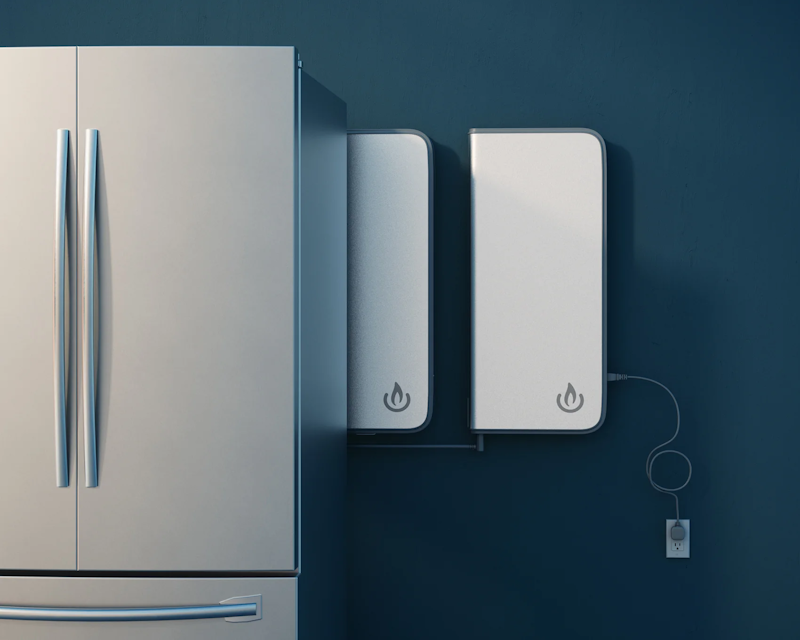
This revolutionary home backup power solution is a first-of-its-kind automatic battery system that delivers up to 60 hours of instant backup power to keep your appliances and personal devices running in the event of a power outage.
It doesn’t require professional installation, and you can easily install it in under 30 minutes by simply setting up its wall mount and slotting the BioLite Backup into it. Its slim design makes it possible for the device to be installed behind a fridge, inside a cabinet, or even under a bed.
The BioLite Backup is available in two primary configurations: the Backup Core, featuring a 1.5 kWh battery capacity that offers between 15 to 30 hours of power, and the Backup Complete, featuring a 3.0 KWh battery capacity that delivers from 30 to 60 hours of power, which is enough to power a microwave, fridge, kitchen lights, and also recharge your smartphone and laptop..
Ultimately, the system’s battery capacity can be expanded up to 10.5 KWh.
BioLite’s single-unit Backup Core goes for $2,000. Comparably, the company’s dual-unit Backup Complete kit goes for $2,999, but this configuration is also eligible for a 30 percent federal tax credit, which brings its cost down to $2,100. Both versions are already available for pre-order and are expected to ship this summer.
Jackery Curved XBC Solar Roof Tiles
Another staple in modern home living are solar panels. Renowned brand in domestic solar generator systems Jackery has taken solar power technology to a whole new level with its latest product, the Jackery Curved XBC Solar Roof Tiles.

Jackery’s innovative solar tiles combine renewable energy integration with aesthetic appeal, eliminating the design compromises of traditional solar panels.
They’re built using ultra-thin 0.13mm crystalline silicon solar cells, while boasting over 25% of cell conversion efficiency and a power generation capacity of 170 watts per square meter, making these solar roof tiles ideal for both residential and commercial applications.
They’re also designed in line with traditional roofing installation practices, featuring a modular setup that allows for flexible maintenance. Their signature 150° Smile Curve, with a sleek 35mm bending height, ensures seamless integration into sophisticated architectural designs.
More importantly, Jackery’s new solar tiles have also been engineered to withstand extreme weather conditions, including temperatures between -40ºF (-40ºC) and 185ºF (-85ºC), while their overlapping design features anti-wind hooks that ensure exceptional wind resistance.
Plus, they also connect with the company’s existing solar generation and storage products.
Jackery’s solar tiles will be available in terracotta and obsidian color options, which the aim of mimicing some of the most common house styles in the country.
Information on availability and pricing will only be available at a later date.
Lenovo Legion Go S
Since the Steam Deck was released, handheld gaming consoles have risen in popularity among gamers. While many renowned brands launched their own gaming handhelds, all those models have used Windows as their operating system, making the Steam Deck the only handheld to run on Valve’s SteamOS. That will soon change with the upcoming release of the Lenovo Legion Go S, for which the company is teaming up with Valve to bring SteamOS to a third-party handheld for the first time.
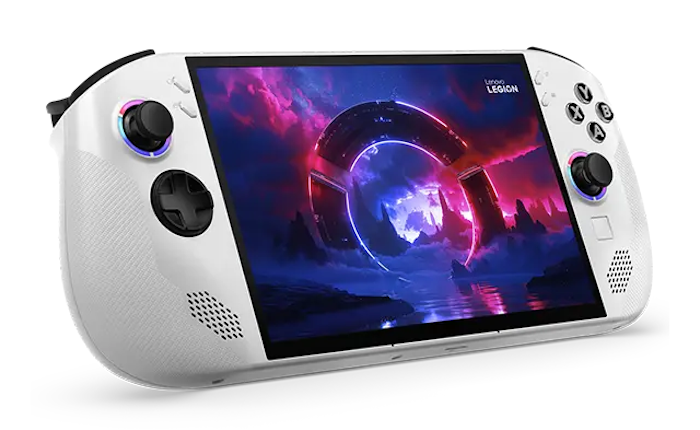
This is Lenovo’s second-gen handheld gaming console, and is the first ever non-Valve gaming handheld to run SteamOS natively.
Designed based on Lenovo’s original Legion Go gaming console (which launched back in 2023), the Legion Go S now features a refined and simplified design, while also coming at a more affordable price than its predecessor. The console is built from plastic, and comes equipped with a total of 23 buttons, including Hall Effect joysticks with RGB lighting, but does not feature removable joysticks.
In addition to the SteamOS model, the Legion Go S will also be available in a Windows 11 Home version.
Nevertheless, the two variants will feature similar specs. The console will feature an 8-inch touchscreen boasting a 1,920 x 1,200 resolution, 16:10 aspect ratio, 500 nits of brightness, 120Hz refresh rate and support for VRR.
For its CPU, users can choose between AMD’s Ryzen Z1 Extreme processor or AMD’s new Ryzen Z2 Go processor, co-developed with Lenovo; which features 4x Zen 3 cores with eight threads and a 4.3Ghz max boost alongside an RDNA 2 GPU with 12 cores, 10MB cache and 15-30W configurable TDP.
The Legion Go S also features a custom ColdFront tech cooling system with a large fan and large heat sinks that help keep thermals in check.
The standard version will feature 512GB storage and 16GB RAM, but its hardware specs can be upgraded to a 1TB PCIe SSD for storage and up to 32GB of RAM (6400MHz LPDDR5X).
The console also integrates multiple connection ports, including two USB4 ports (supporting Thunderbolt 4, DisplayPort 1.4 and Power Delivery 3.0), a headphone jack, and a microSD card slot, and boasts both Bluetooth 5.3 and WiFi 6E connectivity.
For its power, the console will feature a 55.5Whr battery, which supports 65W charging and comes with a bundled adapter.
The Lenovo Legion Go S will be available in two stylish color options: Glacier White and Nebula Violet.
Pricing for the baseline Legion Go S model (featuring a Ryzen Z2 Go processor, 512GB storage, 16GB RAM and SteamOS) will start at $500, with shipping estimated for May 2025. The Windows 11 Home version with 32GB RAM and 1 TB storage will go for $730 and will be available later this month.
Halliday Smart Glasses
Most smart glasses that are currently available on the market have a smart display built into their lens. Halliday recently unveiled its Halliday smart glasses at CES, which feature an “invisible display” that’s integrated into their frame, something that companies like Meta, Google, and Apple have been trying to do.
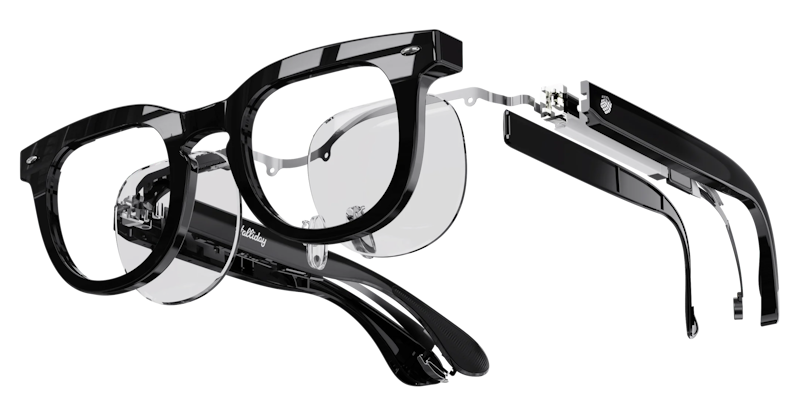
This is made possible by using what the company calls the world’s smallest optical module that’s just 3.6mm in size, which provides users with a field of view similar to that of a 3.5-inch screen while eliminating light leakage and rainbow effects to ensure practical daily use. The main advantage of integrating such a compact display is that the glasses’ frames are noticeably lightweight, weighing just 35 grams. The glasses also sport a modern, everyday-style design.
The glasses’ display is located directly above their right lens, meaning that in order to see it, users simply have to look upwards. While this design-choice may seem counterintuitive, having the graphics placed just slightly above your field of view is actually quite helpful, as it won’t obstruct your view when looking straight ahead. These graphics are displayed in the form of icons, words, and texts in a green font.
Halliday’s smart glasses also integrate a microphone and speakers, and are powered by a battery that offers up to 12 hours runtime.
And, obviously, the glasses also leverage AI features, such as real-time translations in more than 40 languages, a teleprompter text, turn-by-turn navigations, and more, all of which are powered by proactive AI technology, helping to streamline their operation by predicting your intentions while wearing them.
The glasses also come with a smart ring that offers users a discreet control over all of the glasses’ AI functionalities.
Halliday’s smart glasses are available in three colors: Amber, Black, and Gradient. They’ll be priced at $489, but can already be reserved beforehand with a $9.90 deposit, which will get you an exclusive price of $369 for their official launch day.
1-on-1 Interviews with other Tech Companies Attending CES 2023
On top of all the cool tech mentioned above, GadgetGram’s Senior News Writer, João Matos will also be conducting some interviews with representatives from other tech companies, in which we’ll cover each of those interviews in greater detail over the next few days, including:
1. myFirst – myFirst is a global kids-tech brand looking to revolutionize the way children interact with technology through its product line, which is the world’s first kids tech ecosystem, designed exclusively for kids ages 4 and above. myFirst’s product line spans across 10 device categories, with their most recent products including a smartwatch phone, an AI-powered kid’s camera, hearing protection earbuds, and touch-safe 3D pens. Their safe tech and connected devices are integrated with a parent-controlled social network app that empowers kids to learn, play, and grow, while simultaneously providing parents with parental controls to ensure their kids’ safety. (Article covering the interview with myFirst – to be updated soon)
2. Netvue / Birdfy – Netvue is a global company known for its lineup of Birdfy smart bird feeders, which were recently showcased at CES. Under its Birdfy sub-brand, these devices provide effortless backyard birdwatching. Their product line includes a new smart bird feeder with dual cameras, alongside its Birdfy Feeder Series, Bamboo Feeder Series, Hum Feeder Series, and Birdfy Pole Series. Each product features a built-in bird feeder, a 2MP or 3MP camera that streams live HD video of visiting birds directly to a user’s smartphone or tablet, while also leveraging AI recognition technology for accurately identifying over 6,000 bird species worldwide. Through the Birdfy app, users can engage in real-time birdwatching. (Article covering the interview with Netvue / Birdfy – to be updated soon)
3. E-Outdoor SA – Through their groundbreaking new product E-SKIMO, Swiss company E-Outdoor is committed to redefining the future of skiing with the world’s first electric-assisted solution for effortless uphill climbs and flat-surface traverses. Inspired by the success of electric mobility, similar to e-bikes and other battery-powered devices, E-SKIMO combines advanced sensor technology and a seamless design, allowing skiers to enjoy ascents up to four times faster and uncompromised downhill experiences. Designed for internal integration at the OEM level, E-SKIMO aims to make mountaineering more accessible to skiers of all age, ability and conditioning levels, empowering users to fully embrace the thrill of mountain exploration with ease. (Article covering the interview with E-Outdoor SA – to be updated soon)
4. Tombot – Tombot is a robotic animal and digital health solutions company that unveiled their first product at CES 2025 – a robotic Labrador retriever puppy named “Jennie”, designed as a companion for the 300+ million seniors worldwide suffering from dementia or mild cognitive impairment – as well as for adults and children dealing with mental health challenges such as stress, anxiety, loneliness, autism, and PTSD. Exceptionally lifelike and fully autonomous, Jennie flawlessly mimics the sounds, movements and interpersonal interactions of a live puppy. Tombot’s “Jennie” will ultimately receive FDA approval as a certified medical device. (Article covering the interview with Tombot – to be updated soon)
5. WePower – Battery-powered IoT devices are destined to become a “thing of the past”. NY-based WePower Technologies recently launched their Gemns Energy Harvesting Generator (EHG) product line at CES 2025. Offering fully sustainable energy output that circumvents the need for traditional batteries with a capacity that literally lasts a lifetime, this embedded technology deploys permanent and oscillating magnets capable of powering a broad range of IoT devices, from lighting, smart home / smart office appliances and electronics to wireless sensors and transmitters in industrial, automotive, smart city and aerospace applications. Designed for integration at the OEM level, manufacturers will appreciate revolutionary design freedoms, as end-consumers no longer need to replace the batteries from their devices. (Article covering the interview with WePower – to be updated soon)
6. FlowStop – FlowStop is an innovative, inflatable flood barrier designed to protect doorways, windows, and garage entrances from flooding. Lightweight, reusable, and quick to install, it inflates in one-to-four minutes to form a watertight seal and create your first line of defense against flooding. A custom-made device, FlowStop requires no tools nor structural modifications and is easy to deflate and store after use. Suitable for residential, commercial, and municipal applications, FlowStop is eco-friendly and endorsed by major French insurance, nuclear power plants, and governments. It’s a proactive solution to mitigate flood damage and is trusted in over 20 countries worldwide. (Article covering the interview with FlowStop – to be updated soon)